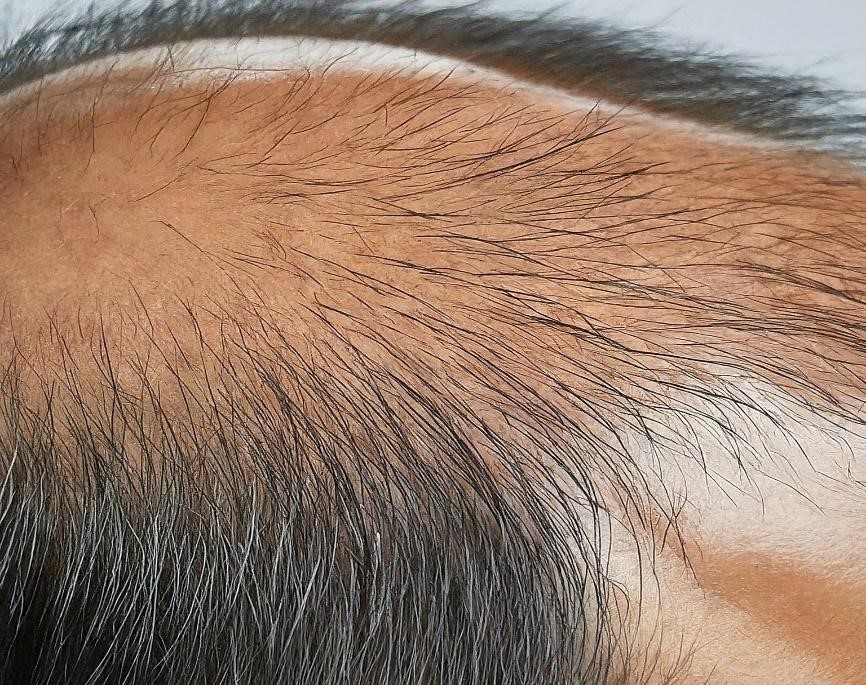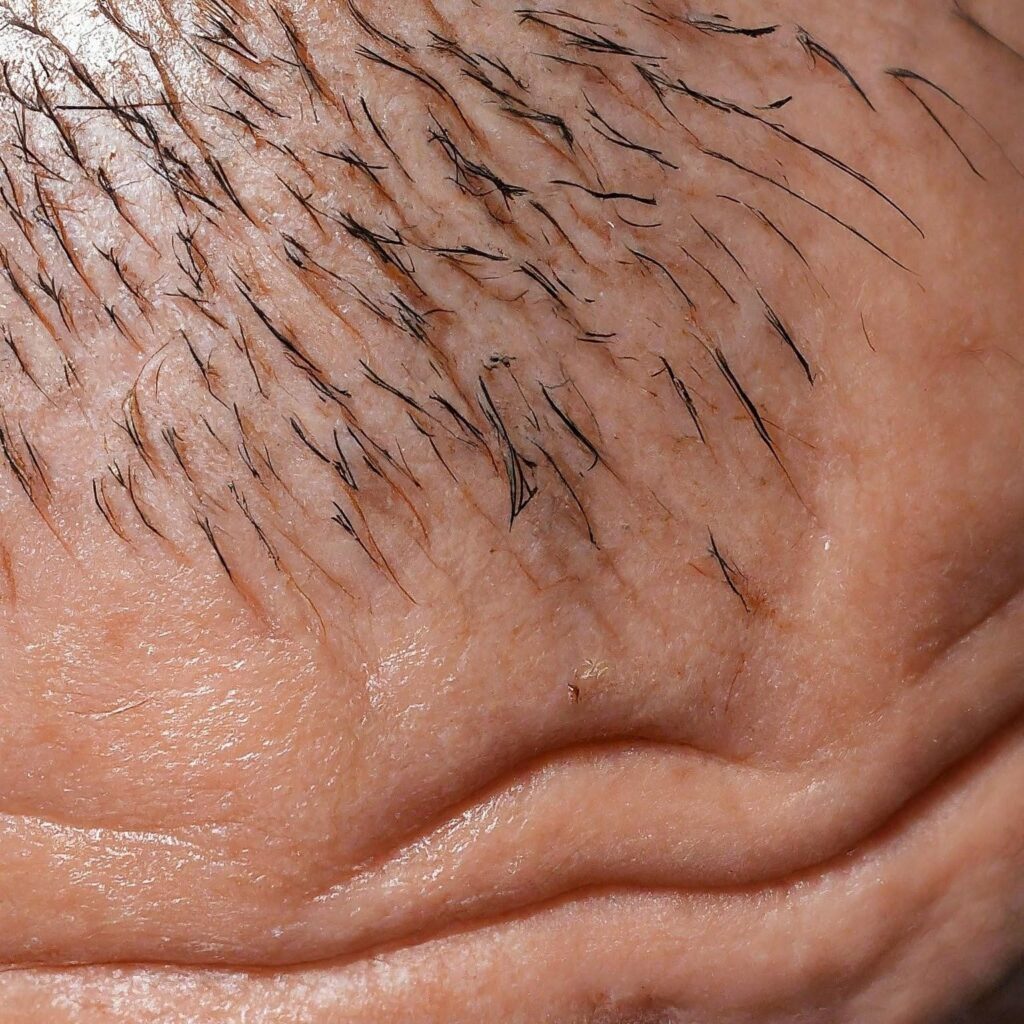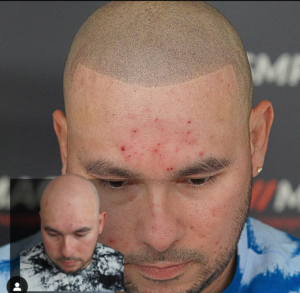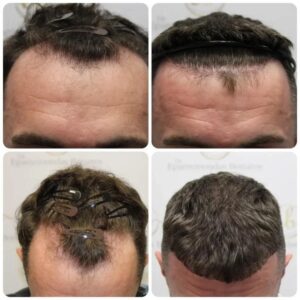Hair loss and alopecia are common experiences that affect millions of people worldwide. While it can be a source of emotional distress, there’s a beacon of hope: the field of hair loss research is constantly evolving, with exciting new discoveries offering promising solutions. This blog post dives deep into the latest research, breakthroughs and innovative treatment approaches currently transforming the landscape of hair loss treatment.
Table of Contents
Key Takeaway
The landscape of hair loss treatment is undergoing exciting transformations. Researchers are unraveling the mysteries behind hair loss, leading to innovative solutions like stem cell therapy, P.R.P. injections, and laser treatments.
While some established options like minoxidil and finasteride remain valuable tools, the future holds immense promise. New breakthroughs like JW0061, targeting the Wnt pathway for hair follicle stimulation, showcase the potential for more targeted and potentially superior therapies.
Maintaining good nutrition and consulting a healthcare professional are crucial aspects of effective hair loss management. As research continues to unveil groundbreaking advancements, the future of hair restoration is brimming with hope.
Hair Loss and Alopecia – What You Should Know
Hair loss, medically known as alopecia, is the partial or complete loss of hair from the scalp or body. It can manifest in various forms, with the most common types being:
- Androgenetic alopecia: This hereditary condition, also known as male pattern baldness or female pattern hair loss, is characterized by a gradual thinning of hair on the scalp. It affects both men and women, and its progression is influenced by genetics and hormones.
- Alopecia areata: This autoimmune disorder causes the immune system to attack hair follicles, leading to sudden patchy hair loss on the scalp, beard, or eyebrows. It can affect people of all ages, and while the hair often grows back, there’s no guarantee of recurrence.
Hair loss and alopecia can also be triggered by various factors, including:
- Hormonal changes: Fluctuations in hormones, such as those experienced during pregnancy, menopause, or thyroid disorders, can disrupt the hair growth cycle and lead to hair loss.
- Medical conditions: Certain medical conditions, such as lupus, anemia, and fungal infections of the scalp, can cause hair loss as a symptom.
- Stress: As research suggests, severe or chronic stress can contribute to temporary hair loss.
- Medications: Some medications, like chemotherapy drugs and certain antidepressants, can have hair loss as a side effect.
The emotional and psychological impact of hair loss can be significant, affecting self-esteem, confidence, and social interactions.
Recent Research Developments
Researchers are constantly unraveling the mysteries behind hair loss, leading to exciting advancements. Here’s a glimpse into some key areas of exploration:
- 2.1 Genetic Factors: Recent genetic studies have identified new genes associated with hair loss susceptibility. This deeper understanding of the genetic underpinnings of alopecia paves the way for the development of personalized treatment strategies based on an individual’s genetic makeup.
- 2.2 Autoimmune Connections: Research on alopecia areata sheds light on the specific immune system pathways involved. This knowledge could lead to the development of targeted immunotherapy treatments that address the root cause of the autoimmune response, offering a long-term solution for those suffering from this condition.
- 2.3 Hormonal Influences: Scientists are delving deeper into the intricate dance between hormones and hair growth. Recent discoveries uncover how hormonal imbalances can disrupt the hair cycle and contribute to alopecia. This research is leading to the development of more targeted hormonal therapies aimed at restoring hormonal balance and promoting hair growth.
Innovative Treatments and Therapies for Hair Loss and Alopecia

The future of hair loss treatment is bright, with a range of innovative approaches emerging from the research pipeline:
3.1 Medications: Beyond the well-established minoxidil and finasteride, new medications are on the horizon. J.A.K. inhibitors, a class of drugs that modulate the immune system, are promising in treating alopecia areata. At the same time, topical medications targeting specific growth factors are being explored for their potential to stimulate hair growth.
3.2 Stem Cell Therapy: Stem cell therapy is promising for hair restoration. Researchers are exploring the use of stem cells derived from various sources, including adipose tissue (fat) and the scalp itself, to regenerate hair follicles and promote hair growth. While still in its early stages, ongoing clinical trials show encouraging results, according to the National Library of Medicine.
3.3 Platelet-Rich Plasma (P.R.P.) Therapy: P.R.P. therapy involves injecting a concentration of a patient’s own platelets into the scalp. Platelets are rich in growth factors that are believed to stimulate hair growth. While research on P.R.P. for hair loss is ongoing, some studies have shown positive results, particularly for androgenetic alopecia. However, more robust clinical trials are needed to determine its long-term efficacy and establish standardized treatment protocols definitively.
3.4 Hair Cloning and Regenerative Medicine: The concept of hair cloning, where hair follicles are grown from a patient’s own cells and then transplanted into areas of hair loss, is still in its early stages of research. However, it holds immense potential for the future of hair restoration. Scientists are also exploring other regenerative medicine techniques, such as using bioengineered scalp tissue to create a conducive environment for hair growth.
3.5 Laser and Light Therapies: Low-level laser therapy (L.L.L.T.) is a non-invasive treatment that uses low-energy laser light to irradiate the scalp. While the exact mechanism of action is still being elucidated, L.L.L.T. is thought to stimulate hair growth by increasing blood flow and cellular activity in the follicles. Studies have shown promising results for L.L.L.T. in promoting hair growth in individuals with androgenetic alopecia.
3.6 JW0061 by JW Pharmaceutical: A promising new hair loss treatment called JW0061 was unveiled by JW Pharmaceutical at a recent dermatology conference. This innovative therapy targets the Wnt pathway, which plays a key role in hair growth. Studies using human skin cells and animal models showed that JW0061 significantly increased hair follicle development and hair growth compared to standard treatments. JW0061 has the potential to be a more effective and long-lasting solution for hair loss by targeting hair growth at a cellular level.
Check out the comprehensive blog post that we wrote on the new JW0061.
Alternative and Complementary Approaches to Hair Loss and Alopecia
While not a substitute for conventional medical treatments, some alternative and complementary approaches may offer additional support for hair health:
4.1 Natural and Herbal Remedies: Several natural remedies, such as saw palmetto, biotin, and pumpkin seed oil, have been touted for their hair growth-promoting properties. However, the scientific evidence supporting their efficacy is mixed. Some studies have shown modest benefits, while others have found no significant effect. It’s IMPORTANT to consult with a healthcare professional before incorporating any herbal remedies into your hair loss management plan, as they may interact with medications or have side effects.
4.2 Diet and Nutrition: While no single food or diet can prevent hair loss, ensuring adequate intake of essential nutrients like iron, vitamin D, and protein is crucial for overall hair health. A balanced diet rich in fruits, vegetables, and whole grains provides the necessary building blocks for healthy hair growth. Consulting a registered dietitian can help create a personalized dietary plan to support your hair health goals. You can check out our nutritional deficiency hair loss article for more information.
Future Directions in Hair Loss Research
Researchers are constantly pushing the boundaries of what’s possible in hair loss and alopecia treatment. Here’s a glimpse into some exciting areas on the horizon:
- Gene Editing: Gene editing techniques like CRISPR-Cas9 hold immense potential for treating hereditary hair loss conditions. This technology could offer a permanent solution in the future by correcting faulty genes responsible for hair loss.
- Nanotechnology: Nanoparticles are being explored as potential carriers for targeted drug delivery to hair follicles. This approach could revolutionize hair loss treatment by delivering medications directly to the site of action, increasing efficacy and minimizing side effects.
Final Thoughts
The field of hair loss and alopecia research is brimming with exciting breakthroughs that offer renewed hope for those experiencing hair loss. While some of these innovative treatments are still in the early stages of development, they represent a significant shift towards personalized and targeted approaches. If you’re experiencing hair loss, it’s important to consult a healthcare professional to discuss your situation and explore the treatment options available. Staying informed about the latest research and advancements can help you make empowered decisions about your hair health journey.
Have you experienced hair loss? Share your story or questions in the comments below! Subscribe to our blog for the latest hair loss research and treatment advancements.
Remember, with ongoing research and innovation, the future of hair loss treatment is hopeful.
Enjoy This Article? You May Also Like:
- Scalp Micropigmentation Training: From Beginner To Mastery – The Ultimate Guide To Becoming An SMP Technician
- Hair Today, Here Tomorrow: Navigating Alopecia Treatments In NYC
- Scalp Micropigmentation New York: Say Goodbye To Thinning Hair And Alopecia
- Hair Tattoos In NYC: The Ultimate FAQ For New Yorkers
- Top Thinning Hair Treatments In NYC: Get Your Hair Back On Track



